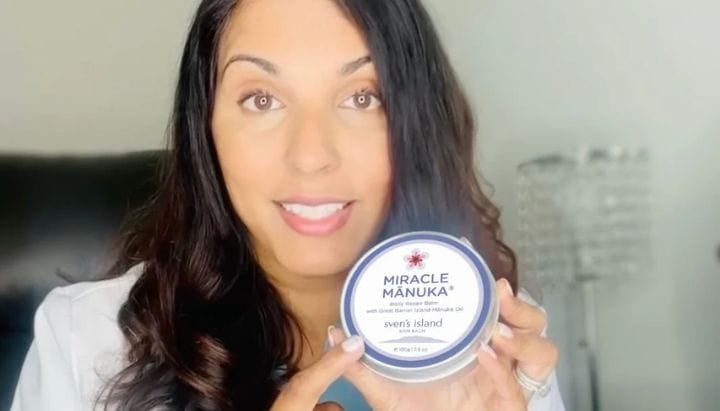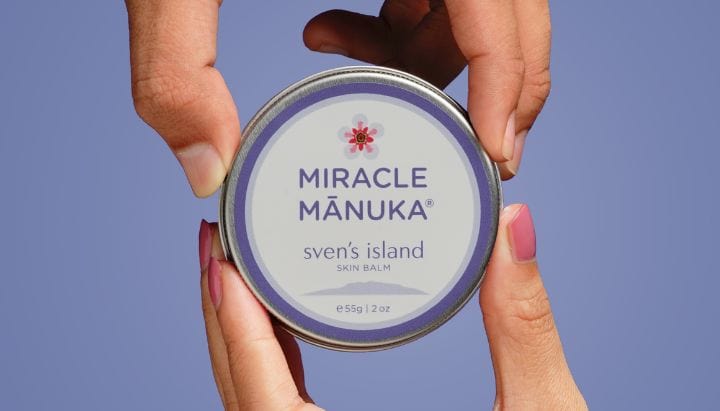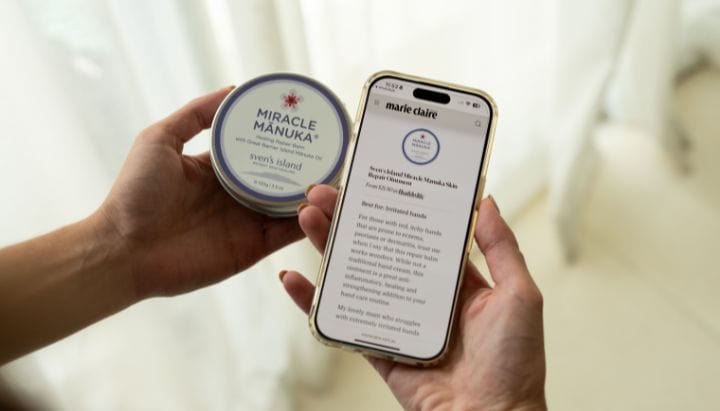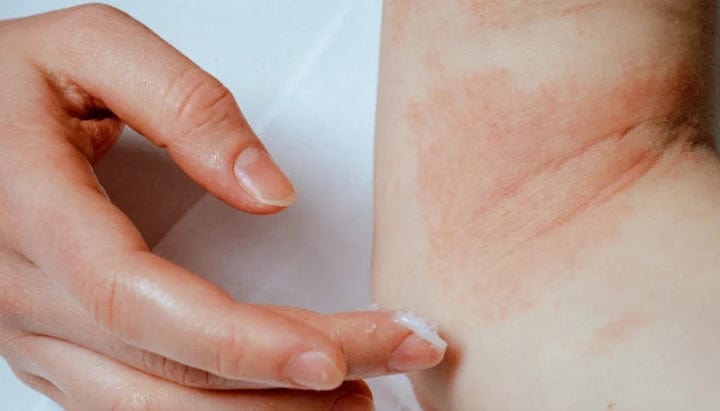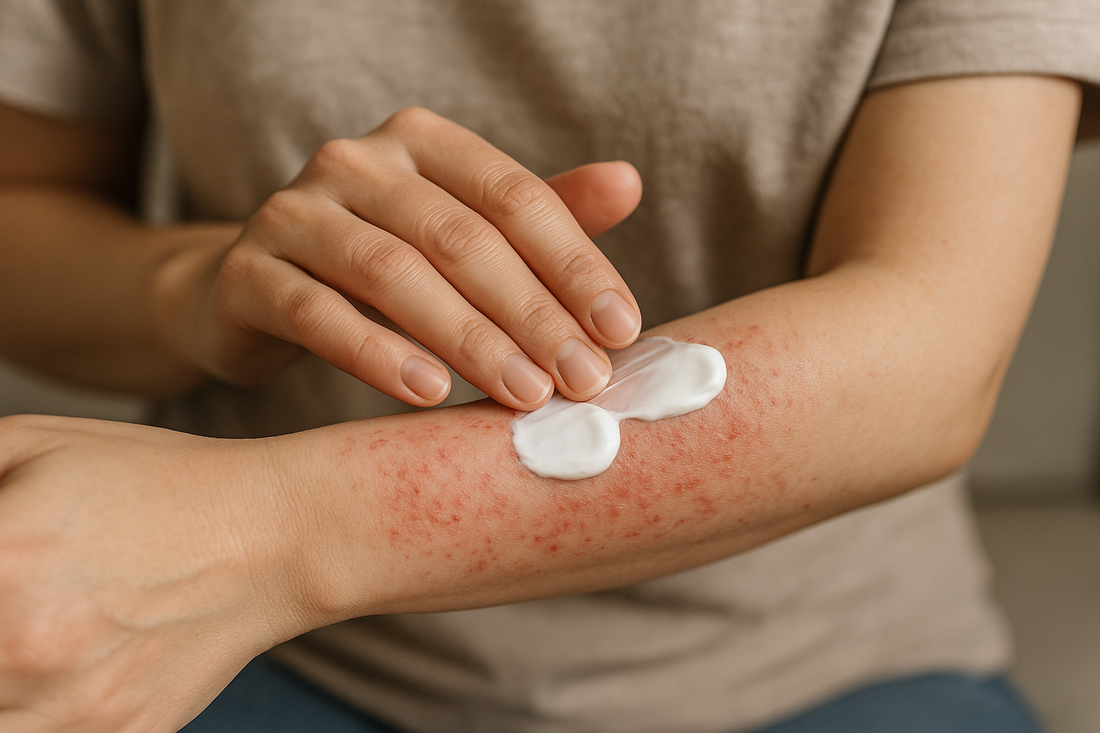When eczema flares up, what’s the first thing we’re told to do?
“Keep the skin moisturized.”
And so we do.
We apply thick creams and lotions multiple times daily, only to feel that creeping frustration when:
✔ Rashes come back.
✔ Itching doesn’t stop.
✔ And skin dryness remains.
So what’s going on?
You’re not alone if you’ve been consistent with moisturizing yours or your child’s skin yet feel like eczema remains unchanged.
So let’s talk about why moisturizers, even the so-called “eczema-friendly” ones, aren’t always the solution we’re led to believe they are.
Moisturisers Help Symptoms, But Not the Cause
The main function of most moisturizers is to hydrate the skin.
And yes, while skin hydration is important, eczema-prone skin tends to lose its moisture too quickly, which makes it difficult for moisturizers to assist in helping.
But eczema isn’t just dry skin.
The condition consists of a compromised skin barrier that may also include inflammation beneath the surface and bacterial imbalances.
Moisturizers soothe.
But they don’t heal.
And they definitely don’t address the reason your child’s eczema keeps flaring up.
Eczema Is a Skin Barrier Problem, Not a Moisture Problem.
The skin’s natural barrier functions in a similar way to a brick wall.
In healthy skin, the bricks (skin cells) and mortar (natural fats and proteins) work together to keep irritants out and moisture in.
But in eczema-prone skin, the wall has cracks.
Eczema-prone skin allows moisture to escape easily while letting allergens and bacteria enter as irritants make their way through.
So what happens when you apply a basic moisturizer?
💧 It might temporarily fill in the cracks, but it doesn’t fix the wall.
And when the moisturizer wears off, it’s back to square one.
Some Moisturizers Actually Make The Problem Worse.
Not all moisturizers are created equal.
In fact, many well-known "eczema creams" contain ingredients that can work to irritate sensitive skin even more after prolonged use.
Common culprits include:
🚫 Fragrance or essential oils (even the “natural” ones)
🚫 Preservatives like parabens or methylisothiazolinone
🚫 Alcohol-based ingredients that dry the skin out
🚫 Lanolin or petroleum (can clog or suffocate the skin)
Even creams that feel rich and thick may be doing more harm than good if they’re not designed for compromised skin.
Instead, make sure to look for creams that use calming ingredients that reduce inflammation while avoiding unnecessary fillers and chemicals.
Moisturisers Don’t Fight Eczema Triggers
Another reason moisturizers often fall short?
The products do not resolve the root cause of eczema flare-ups.
Eczema can be triggered by:
Heat and sweat
Soaps, shampoos, or laundry detergents
Dust mites or pet dander
Certain fabrics
Stress or overstimulation
Bacterial overgrowth (especially Staph aureus)
So while moisturizers provide temporary relief for dry skin, they cannot prevent flare-ups if deeper irritants continue to affect the skin from external or internal sources.
💡 What can help: Track your child’s daily activities along with their surrounding environment and food intake during each eczema episode. Through observation you might identify repeating patterns that reveal hidden triggers.
So… Should You Stop Moisturizing?
Absolutely not.
Moisturizing remains essential in eczema treatment but must be combined with other management steps.
The key is to:
✔ Choose moisturizers that go beyond hydration; look for ones that support the skin barrier and reduce inflammation without irritating additives.
✔ Be consistent; apply after baths, before bed, and any time the skin feels tight.
✔ Pair it with other care steps, like trigger avoidance, gentle soaps, and temperature control.
Final Thoughts: It’s Not Your Fault, And You’re Not Alone.
Parents of children with persistent eczema often feel they've overlooked some important care steps.
You’ve been instructed to “keep moisturizing” without fully understanding the complete treatment approach.
A full solution to your child's eczema requires more than just moisturizing.
A comprehensive approach to improve your child’s skin health involves repairing their skin barrier along with managing flare-up triggers to establish an effective care routine.
You’re doing your best, and you’re doing a great job.
Your child’s skin will develop increased calmness and strength through proper knowledge and support.
Keep going. You’re not alone in this.
